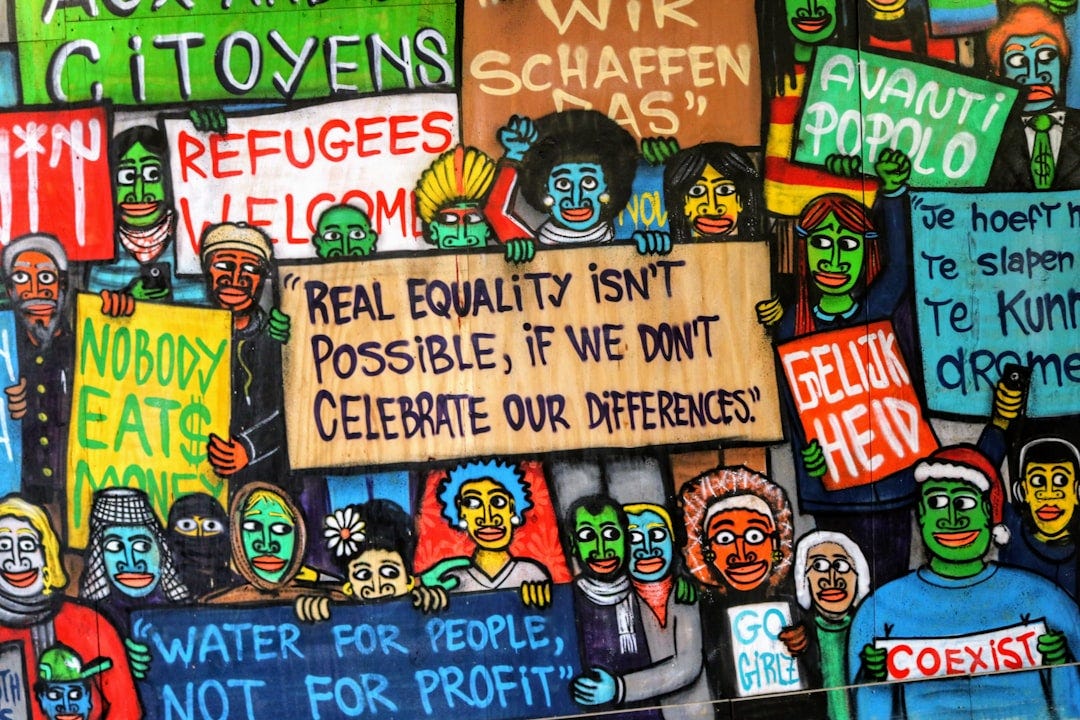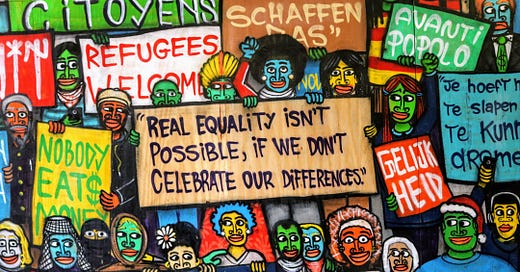We Need To Talk About Forced Sterilization
Eugenics is alive and well. We need to end it, once and for all.

I can’t say that the recent political news cycle in the States has calmed down.
Between the indictment and subsequent arraignment of Donald Trump, breaking news about Justice Clarence Thomas, the expulsion of two representatives from the floor in Tennessee, and the ongoing onslaught of draconian anti-trans legislation…the situation in the United States is a little rocky right now, to say the least.
Still, I’ve been focusing too much of my attention on the U.S.A. recently, and not enough attention on global causes of human rights. It is important to track what goes on in the States due to their stranglehold on world politics, but it isn’t the only thing that merits our attention.
With that in mind, it’s time to return to your scheduled programming. And I’m sorry in advance, because this edition is going to be heavy. Researching and writing it is rough, I know that reading it is going to be painful. But this is a subject that needs discussion.
Today, I’m going to talk about eugenics and forced sterilization.
I’m going to discuss prejudice and bigotry, issues like racism, genocide, disability stigma, and hatred for the LGBTQ+ community.
Before I continue, I want to make it clear: I am a white woman. When discussing racism, I am doing so only from the lens of what I have witnessed happening to others, or what has been described to me. I can’t speak from personal experience.
I strongly recommend that you seek out the voices of people of color to hear their perspective and experiences with racism and how it affects their lives.
Black Lives Matter. BIPOC Lives Matter.
Forced Sterilization and Eugenics
So, let’s talk about eugenics.
Eugenics is a controversial social movement. It is a belief that stems from the practice of animal husbandry; that if you are selective and intentional with which animals you breed together, you can exert some control over the traits of the offspring.
Eugenics takes this idea and applies it to human beings. Eugenicists believe that by preventing some people from having children, and encouraging or forcing other people to reproduce, the evils of society could be fixed.
It has been used in the past as justification for forced sterilization programs, which sought to limit reproduction among members of stigmatized populations. It has also been used to justify what were essentially breeding programs, such as the Lebensborn program created by the Third Reich in Nazi Germany.
They sought to prevent the birth of people they thought were inferior and increase the population of people they felt were worth more to society.
Proponents of eugenics argued that it would lead to an overall improvement in public health and the reduction of poverty. They felt that by controlling reproduction, they would be able to remove the traits that led to criminal behavior, low intelligence and laziness.
If you’ve paid attention to the kind of stereotypes that racists use for minority groups, especially people of color, you probably recognize this line of thought.
To be perfectly clear, there is no justification for ascribing negative traits across an entire demographic. There is no evidence whatsoever that people of color somehow have ‘inferior genetics’. The claim is not based in fact, but rather in prejudice, bigotry and fear.
Forced sterilization programs were implemented in many countries around the world. In Canada, many provinces had laws that made it legal, and in fact mandatory to sterilize people with disabilities. There are also many cases of First Nations women being pressured or forced into being sterilized, both in the past and in recent years.
The Sexual Sterilization Act of Alberta, signed in 1928, is a prime example. The Act was finally repealed in 1972, after thousands of victims were put through the procedure without consent.
In the United States, there was a Supreme Court decision called Buck v Bell back in 1927. The decision ruled that forced sterilization of certain persons, such as the disabled, criminals, the mentally ill or the poor, did not violate the 14th amendment to the Constitution.
The 14th cements the citizen’s right to due process and established protections against unfair treatment. It is important to note that Buck v Bell, as far as I’m aware, has never been officially repealed.
The practice of forced sterilization has been widely condemned for its violation of human rights and ethical issues. Most of us would agree that forcing an individual to be sterilized against their will is a violation of their bodily autonomy.
It’s also important to talk a little bit about some of the narratives and fear mongering around transgender people, specifically children.
It’s a common talking point for transphobic people to claim that going through gender affirming care is the same thing as sterilizing a child. This is not actually the case.
While it is true that some forms of gender affirming care can cause issues with fertility, it’s vital to understand that not all transgender people go through the exact same forms of treatment.
Gender affirming care is highly individualized, and the current standard of care is to create a plan that will work for the one particular person on a case-by-case basis. It isn’t one size fits all.
Not all transgender people take puberty blockers. Not all transgender people go through hormone therapy. Not all transgender people get surgeries, and permanent changes to the body are limited to legal adults.
Social transition is by far the most common form of transition, and that mostly entails simple changes like haircuts, clothing, choosing new names and pronouns and sometimes voice training.
On the other hand, if you’re genuinely concerned about people being sterilized against their will, it might be a good idea to look at the countries that currently require a trans person to be sterilized before they can legally change their gender. Countries such as Japan, Singapore, some States in the U.S., Australia, and many others.
Forcing people to go through invasive surgical procedures that they don’t want just so they can have their identities respected is cruel and inhumane, to the point that the United Nations declared the practice to be a form of torture.
Not all transgender people want to be sterilized. Some may choose to be, some may even have steps taken to ensure they can have biological children later on, such as freezing sperm and eggs for IVF.
Many trans people want to be parents just as much as anyone else! Forcing them to give that up just to have their identities respected is unreasonable.
You can read the full document on the subject of forced sterilization Here. Scrolling down to page 7 of the PDF will bring you to the statement on transgender and intersex people, but I would strongly recommend reading the whole thing. This is an issue that impacts all minority groups and marginalized communities.
Treat Human Beings with Respect
In my research, I often think to myself that so many problems of the world could be solved very easily.
If we could just learn to treat other human beings with respect and empathy, no matter where they come from, what they look like, who they worship or who they love, a lot of the conflict in our daily lives would simply end.
Unfortunately, we humans are prone to dividing ourselves along imaginary lines.
Bigotry: When We Define and Demonize the Other
To put an end to forced sterilization laws, we have to look at our legislatures.
Find out who your representatives are in your municipal, provincial or state level, and send them messages. A call, an email, a letter. Let them know that you want to see harmful laws repealed, and protective laws created.
Contact your federal government, sign petitions, make noise. Remind them of the UN statements on forced sterilization that I mentioned above. Quote from the declaration to help make your point.
Practices that come from beliefs like eugenics are not valid. They should not be given consideration; they should not be seriously looked at by anyone.
There is no such thing as an inferior person.


